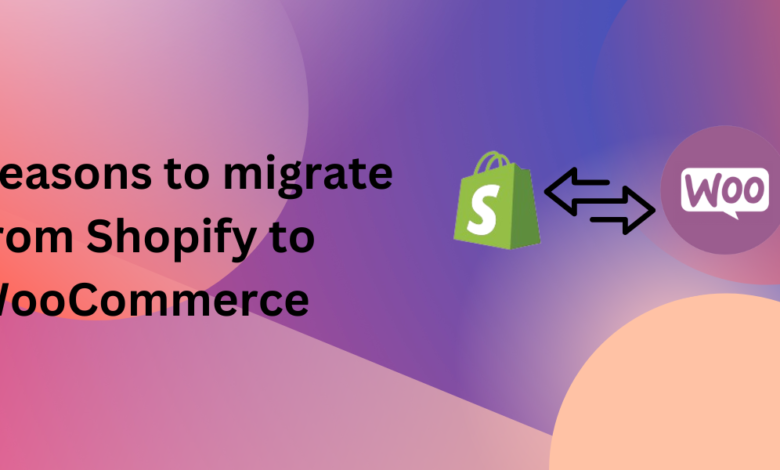
As online shopping continues to grow, many eCommerce businesses are exploring ways to optimize their stores and elevate the shopping experience for their customers. If you’re considering a platform change, you may be weighing the benefits of migrating from Shopify to WooCommerce. Both platforms have their strengths, but WooCommerce offers distinct advantages in customization, cost-effectiveness, and overall control.
This guide delves into the reasons why migrate from Shopify to WooCommerce can be highly beneficial for your store’s long-term growth, including key features and benefits that will help you make the most of your online business.
Why Choose WooCommerce over Shopify?
Both Shopify and WooCommerce are popular eCommerce platforms, each offering unique benefits. Shopify is known for its simplicity and ease of use, making it appealing to newcomers. WooCommerce, however, is a WordPress-based platform that provides extensive customization options and more flexibility in terms of functionality.
When you migrate your store from Shopify to WooCommerce, you gain more control over your website, payment options, SEO, and even security. Let’s dive into these benefits in more detail.
Key Benefits of Migrating from Shopify to WooCommerce
1. Greater Control and Ownership
With Shopify, you’re essentially renting space on their platform, which limits your ownership of the store. WooCommerce, on the other hand, is a self-hosted platform, meaning that you have full control over your store’s files, data, and hosting environment. This ownership is critical for scaling and customizing your store to meet your unique business needs.
Being able to control hosting, for example, allows you to select the best provider for your needs and budget. Additionally, WooCommerce gives you access to a wide range of server customization options, which is ideal if you want to optimize site performance and have more control over speed, security, and backups.
2. Cost-Effectiveness and Flexibility
One of the most appealing aspects of WooCommerce is its cost-effectiveness. Shopify charges a monthly fee based on the plan you choose, and extra charges for themes, plugins, and transaction fees can add up. WooCommerce, however, is a free plugin for WordPress, which allows you to minimize initial costs. While you may have to pay for certain add-ons or premium features, you won’t be tied to a monthly subscription.
Furthermore, WooCommerce is more flexible when it comes to payment gateways. Unlike Shopify, which has its own payment processor with added fees for third-party gateways, WooCommerce supports a vast array of payment methods without any added transaction fees. This allows you to save on transaction costs and provide a more tailored checkout experience for your customers.
3. Extensive Customization Options
WooCommerce’s extensive customization capabilities make it a powerful choice for brands that want a unique, personalized shopping experience. Unlike Shopify’s limited themes and customization, WooCommerce is open-source and works with WordPress, allowing for an almost endless array of themes, plugins, and custom development.
You can choose from thousands of free and premium WordPress themes designed specifically for WooCommerce, each of which is highly customizable. Additionally, if you have coding skills (or hire a developer), you can directly modify the code to create a unique look and feel for your store. This customization extends to plugins as well, where you can integrate WooCommerce with other tools and software to add advanced functionality like AI-powered search, advanced product filters, and personalized recommendation engines.
4. Enhanced SEO Capabilities
WooCommerce, built on WordPress, has a significant advantage over Shopify when it comes to SEO. WordPress is known for its SEO-friendliness and the vast array of plugins, like Yoast SEO, that can help optimize your website’s visibility on search engines.
With WooCommerce, you have more control over URL structures, meta descriptions, alt tags, and schema markup—essential tools for improving search engine rankings. Furthermore, WordPress offers full control over your blog and content marketing strategy, which is an important aspect of SEO. For businesses relying on organic traffic, WooCommerce’s SEO capabilities can lead to a considerable boost in search engine rankings and visibility.
5. No Platform Restrictions and Vendor Lock-In
Since WooCommerce is open-source and self-hosted, you won’t face vendor lock-in like with Shopify. Shopify users are limited to the platform’s features, hosting, and payment gateways, which can be restrictive.
In contrast, WooCommerce lets you make all the changes you want to your website, including custom code and external plugins. Since you control the hosting, you’re free to switch providers if your needs change without worrying about losing access to your store. WooCommerce offers this flexibility by allowing you to scale and adapt as your business grows, without the worry of migrating from one platform to another.
6. Advanced Product Management
Product management is a crucial aspect of any eCommerce business, and WooCommerce provides several advanced product management features that Shopify does not. In WooCommerce, you can easily set up complex products, including customizable items, bundles, and downloadable products.
Additionally, WooCommerce supports various product attributes, categories, tags, and SKUs that help you manage and display products efficiently. This is particularly helpful for stores with large inventories or niche products that require detailed specifications and options.
7. Improved Data Ownership and Security
Data security is a top priority in eCommerce, and WooCommerce offers you complete control over your data. Since WooCommerce is hosted on your own server, you are responsible for your store’s security, allowing you to take measures that Shopify may not offer. You can implement advanced security practices, choose secure hosting providers, and add SSL certificates to protect sensitive information.
Owning your data is not only safer but also gives you access to in-depth customer insights that you can leverage to improve your marketing efforts. For example, by analyzing customer behavior data, you can customize your product recommendations, adjust pricing strategies, and fine-tune your marketing campaigns.
8. Rich Community and Support Resources
WooCommerce’s popularity means it has a large community of developers, designers, and users who create resources and provide support. WooCommerce has an extensive documentation library, covering everything from basic setup to advanced configurations, which is especially helpful during migration. Additionally, WooCommerce offers a vast selection of free and premium extensions that can add any functionality you may need to your store.
For more specific help, you can access WooCommerce forums, third-party blogs, and an extensive knowledge base of tutorials, making it easier to troubleshoot and optimize your site. WooCommerce also has customer support options, including dedicated support teams, for any questions or concerns you may have along the way.
Conclusion
Migrating from Shopify to WooCommerce can offer numerous benefits that give you more control, customization, and cost efficiency for your eCommerce business. WooCommerce’s open-source nature, combined with the robust features of WordPress, makes it an ideal choice for brands looking to create a unique shopping experience.


